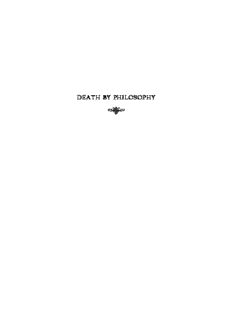
Death by Philosophy: The Biographical Tradition in the Life and Death of the Archaic Philosophers Empedocles, Heraclitus, and Democritus PDF
Preview Death by Philosophy: The Biographical Tradition in the Life and Death of the Archaic Philosophers Empedocles, Heraclitus, and Democritus
DEATH BY PHILOSOPHY 8 D P EATH BY HILOSOPHY 8 The Biographical Tradition in the Life and Death of the Archaic Philosophers Empedocles, Heraclitus, and Democritus Ava Chitwood THE UNIVERSITY OF MICHIGAN PRESS AnnArbor Copyright!bytheUniversityofMichigan2004 Allrightsreserved PublishedintheUnitedStatesofAmericaby TheUniversityofMichiganPress ManufacturedintheUnitedStatesofAmerica "! Printedonacid-freepaper 2007 2006 2005 2004 4 3 2 1 Nopartofthispublicationmaybereproduced,stored inaretrievalsystem,ortransmittedinanyformorby anymeans,electronic,mechanical,orotherwise, withoutthewrittenpermissionofthepublisher. ACIPcatalogrecordforthisbookisavailablefromtheBritishLibrary. LibraryofCongressCataloging-in-PublicationData Chitwood,Ava,1953– Deathbyphilosophy:thebiographicaltraditioninthelifeanddeathofthearchaic philosophersEmpedocles,Heraclitus,andDemocritus/AvaChitwood p. cm. Includesbibliographicalreferencesandindex. ISBN0-472-11388-7(cloth:alk.paper) 1.Empedocles. 2.Heraclitus,ofEphesus. 3.Democritus. 4.Philosophy,Ancient. I.Title. B218.Z7C47 2004 182—dc22 [B] 2004048051 To my mother and my father ! ! ! θυµωιµα&’εσθαι’αλεπ,&ν!,. γα&ρα1νθε&ληι,ψυ’ηςω5νειται. Heraclitus Acknowledgments 8 I would like to acknowledge the help generously given by the following people: to Mary Lefkowitz, Diskin Clay, and Robert Wagman, my first readers, I owe more than I can say; any excellence this book achieves is largely due to them. I am grateful to my two students, Olya Novozhilova and Joe Coleman, for their help with research and bibliography. Mary- Anne Eaverly was a bright and steady light through the dark days of revision, and I am greatly in her debt. I offer sincere thanks to a remark- ablefriendandscholar,JoanneWaugh,forherunstintingencouragement andoptimism;thisbookwouldneverhavereachedpresswithouther,and shecontinuestoinspiremeeveryday. Contents 8 Introduction 1 ONE Empedocles 12 TWO Heraclitus 59 THREE Democritus 94 Conclusion 141 IndexofCitations,Fragments, andAnecdotes 147 Notes 153 Bibliography 191 Index 201 Contents 8 Introduction 1 ONE Empedocles 12 TWO Heraclitus 59 THREE Democritus 94 Conclusion 141 IndexofCitations,Fragments, andAnecdotes 147 Notes 153 Bibliography 191 Index 201 Introduction 8 AccordingtoDiogenesLaertius,EmpedoclesdiedbyjumpingintoEtna— and by hanging, by drowning, by falling, by traveling, and not at all: he simplyvanishedintothinair.Whysomanyandsuchvarieddeaths?What connectiondothesemultipledeathshavetothelifeandworkofEmpedo- cles,aspresentedbyDiogenesLaertiusinhisLivesofEminentPhilosophers? Whatistheconnectionbetweenthehistoricallifeandphilosophicalwork ofEmpedocles,andDiogenesLaertius’biographicalaccountofthem? Thesewerethequestionsthatlaunchedthepresentwork,whichexam- ines the biographies of three archaic philosophers, Empedocles, Hera- clitus, and Democritus, by tracing the direct and correlative relationship thatexistsbetweenthebiographicaldataintheworkofDiogenesLaertius andtheextantfragmentsofthesephilosophers.Nowheredoesthecorrela- tionbetweenbiographyandphilosophyoccurmoreclearlythanintheuse of anecdotal material; nowhere in the anecdotal material is the correla- tion more striking than in Diogenes Laertius’ use of various deaths to illustrate and exemplify his subjects’ philosophy, morals, beliefs, idiosyn- crasies,andfoibles.Thisapproachtophilosophicalbiographyyieldsthree 2 DEATH BY PHILOSOPHY important results: a method by which to analyze and interpret the inter- play between biography and philosophy; a suggestion that a reevaluation of Diogenes Laertius is due; and a system by which to classify and study themechanicsofancientbiographyingeneral. The study of biography is not new ground for the classical scholar, although thenotionofadirectcorrelationbetweenbiographyandlitera- ture has not always, or even generally, been accepted. In 1981, however, Mary R. Lefkowitz broke new ground with her book, Lives of the Greek Poets. Her methodology yielded fresh and compelling interpretations of both biographers and poets, winning widespread support for thenew bio- graphicaltheory. Lefkowitzarguesthatthepoets’livesaretakenfromtheirpoetry,which is read by the biographers as a series of personal statements. That is, the ancient biographer analyzes the subject’s work in an autobiographical manner, a reading frequently aided by use of the first person (“I”) by the poet. The biographer’s reaction to those (seemingly personal) statements leads to the formation of a favorable or negative biographical tradition, which is illustrated in the poet’s life by the use of anecdotes set in schematizedpatternsandformulas.Forinstance,inthebiographicaltradi- tion that exists for Sappho, the poet throws herself over a cliff to her death in despair over her unrequited love for a handsome young man. LefkowitzdemonstratesthatthestoryofSappho’ssuiciderevealsunfavor- able reaction to her first-person lesbian references, negates those refer- ences,andpunishesthepoetforthem. However, Lefkowitz’s work, like most other studies of this kind, is restricted to poetry and the poets. Fortunately, Alice S. Riginos’ 1976 Platonica: The Anecdotes concerning the Life and Writing of Plato, has gone far in demonstrating a similar approach in the biography of Plato. In the Platonica Riginos successfully argues that Plato’s biography, especially in the use of anecdotal material, adheres to these reaction formations and formulaic schema. The many anecdotes that speakof PlatoandDionysus of Syracuse, for example, fall into a well-established category that con- trasts “philosopher” (free, intellectual, Greek, civilized) with “tyrant” (slavish, uneducated,barbarian, uncivilized).Itisananecdote,aswewill see,thatexistsforalmosteveryphilosopherwhohasabiography. The present work, then, examines the lives of three archaic philoso- phersascompiledandwrittenbyDiogenesLaertiusinhisLivesofEminent Philosophers. The method, the identification of anecdotes and pat- terns that correspond to the philosophy of the subject, is a fascinating Introduction 3 revelationoftheancientbiographicalmindatwork.Forinstancethelives ofEmpedoclesandHeraclitus,andindeedthelivesofmanyotherphiloso- phers,bearsomeresemblancetoeachother,giventhatancientbiography runsalongschematizedpatternsandforms.BothHeraclitusandEmpedo- cles,forexample,areaskedbytheirfellowcitizenstorule,andbothrefuse to do so. But there the similarity ends. Empedocles is celebrated by the biographers as an ardent democrat for his refusal, while Heraclitus is denouncedasamisanthropeforhis.Obviously,therefusaltoruleisbeing usedincompletelydifferentways:Empedoclesisglorified,Heraclitusvili- fied. Why is the same anecdote used to such different ends in the two lives? To the biographers, the philosophers, like the poets and especially thosewhowroteinthefirstperson,wereneversimplywritingphilosophy. To be sure, the archaic philosophers were not writing philosophy in the modern sense of writing philosophy. For modern thinkers, philosophy is the expression not of personal beliefs but of the conclusions that any rationalbeingwouldarriveatafterabstract,thatis,impersonalreflection. Inwhatfollows,Iwilluse“philosophy”inthemodernsense,althoughitis by no means clear that the ancients thought of philosophy as an “imper- sonal,abstract”affair. Rather, especiallyforbiographerssuchasDiogenes Laertius, philosophical works were also, and sometimes even primarily, readasautobiography.Philosophy,likepoetry,wasseenasacollectionof personal or autobiographical statements, to which the biographer re- sponds in kind. For example, in the course of his philosophical work, Heraclituscomparesmentoapesandchildren.Thebiographer,interpret- ing these remarks as personal rather than philosophical convictions, saw an ugly misanthropy at work and perhaps even one that applied to him personally.Thebiographers’reactiontoHeraclitusandtohisworkwas,in fact, generally unfavorable and manifests itself in an unusually hostile biography; hence Heraclitus’ refusal to rule becomes another example of the philosopher’s misanthropy. Empedocles, on the other hand, in his workaddresseshisfellowcitizensas“friends”andsaysthatthe“bestmen” becomepoliticalleaders.Hisphilosophicalstatementsthereforeimpressed the biographers in a favorable manner and result in a generally favorable biographical tradition; his refusal to rule glorifies the philosopher as a selfless, sympathetic, and democratic fellow citizen. So within any philo- sophical biography, a single anecdote can work in quite different ways according to the biographical tradition that exists for the individual phi- losopher.Thatbiographicaltradition,favorableorhostile,arisesfromthe
Description: